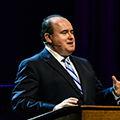No two church-plant situations are exactly alike. Some are driven upfront by a qualified pastor who is actively putting together a core group. Others are driven by an established church that is seeking to extend its influence and the reach of the gospel via church-planting. And still others—the primary focus of this series of articles—are driven by concerned Christians in a geographic area in need of a biblical church. In the last two scenarios, what are key qualities in a founding pastor?
He is Qualified by Other Qualified Pastors
A man simply proclaiming himself to be a qualified pastor is (a) insufficient and (b) a red flag that church-planting is a means of power and control for him. Instead, he must be a man qualified according to the qualifications of 1 Timothy 3 and Titus 1, identified as such by other qualified men such as the eldership at an established church who has witnessed the man’s ability and character over time. Self-qualified pastors are a contradiction in terms.
He Clearly States His Ministry Objectives Upfront
It may be that some pastors act more in a missionary role in which they desire to plant churches (perhaps even supported by another church or by missionary donations) in order to pass an established church on to a later-identified permanent pastor. Others may want to be that permanent pastor and are eager to put in the work to settle into a now-established church after years of hard labor. Both options are viable and the core group should know the potential pastor’s intention and goal.
A church-planting pastor ought to be a man of spiritual depth, knowledge of the Word, and characterized by a humble and worshipful walk with Christ.
He is a Seasoned Preacher
I will address this is a later article, but it is difficult enough to get a church plant off the ground with an experienced preacher. But if the pastor is inexperienced in the pulpit, the “neonatal” church will have a high likelihood of failure. Nothing is more discouraging to a core group who invests in a founding pastor than to find out that the two sermons they heard him preach at first were his best ones. Church plants thrive on the reputation of the preached Word of God and if the reputation is quickly “shallow” or “boring” or “scattered” rather than “theological” and “rich” and “expository” and “applicational,” then the group will likely not survive.
But it may be possible that a man has all the character needed but without the experience. It is possible for a core group to value that character and give the man time to develop and learn by experience before launching out to make the church-plant more widely known. I know of one church plant which brought an inexperienced preacher who was godly, wise, and committed. They gave him time to develop and the church began to thrive.
He is an Organized Intentional Disciple-Maker
A church-planting pastor simply must be organized. And he must have a clear vision of the how and why of leading others. He is beginning in most cases as the sole qualified elder and thus he must immediately begin the process of teaching both the whole church (or core group) and at a higher level, men with potential for eventual leadership. This is a years-long process and thus he must have a plan and have the organizational skills to execute that plan.
He is Not Afraid of Hard Work
If a founding pastor believes he is going to immediately have the luxury of simply preparing sermons and Bible studies and attending the occasional meeting, then he is likely not built to be a founding pastor. In my days as a church planter and as a pastor of revitalization work, I have had to do a little of everything at various times (all except keep the nursery!). Of course, his goal is to quickly train up others to do as many things as possible and the core group should be the primary means by which he does focus as much as possible on the preached Word and on discipleship. But he cannot be afraid of hard work and long hours for a time at least.
He is a Man of Depth and Humility in His Walk with Christ
I have encountered men who desire to plant a church but perhaps that desire is founded more in an entrepreneurial personality rather than a yearning to advance the kingdom of Christ. The thrill or excitement he derives from a venture like a church plant might be better spent on simply starting a business. A church-planting pastor ought to be a man of spiritual depth, knowledge of the Word, and characterized by a humble and worshipful walk with Christ. Conversations with him lead naturally to the things of God. His own relationship with the Lord is clearly tender, humble, prayerful, and focused on his own growth and sanctification. This is a man under which the church can flourish.

